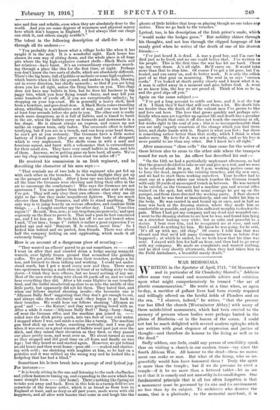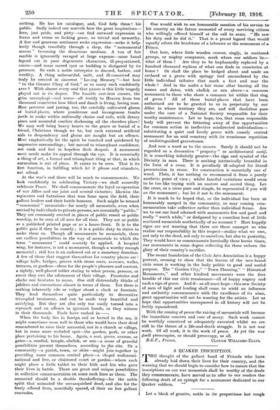WAR MEMORIALS.
WRITING in the Spectator of April, 1711, "Of Monumen's and in particular of Sir Cloudesley Shovel's," Addison offers some very sound and seasonable advice and criticism upon what might comprehensively be termed " the art of
plastic commemoration." He wrote at a time when, as again to-day, a sacrifice of gallant lives had been sternly required and willingly offered on the fateful fields of Flanders and on the sea. " I observe, indeed," he writes, " that the present war has filled the church [Westminster Abbey] with many of these uninhabited monuments, which had been erected to the memory of persons whose bodies were perhaps buried in tho plains of Blenheim—or in the bosom of the ocean. I could not but be much delighted with several modern epitaphs which are written with great elegance of expression and justice of thought—and therefore do honour to the living as well as to the dead."
Sadly seldom, one feels, could any person of sensibility speak thus on visiting a church in our modern times—say since the South African War. All honour to the dead—them no monu- ment can make or mar. But what of the living, who so un- gracefully would fain have honoured them ? Truly the spirit
is more than the temple ; but if we do presume to erect a temple—if it be no more than a lettered tablet—let us see to it that it is comely and not unworthy in its small degree. One fundamental principle that is all too often forgotten is that a monument must be governed by its site and its environment no less than by its subject. To architects who deserve the name, that is a platitude ; to the memorial merchant, it is nothing. He has his catalogue, and, God help them ! his public. Sadly indeed one marvels how the great inspirations— love; just pride, and piety—can find outward expression in forms and terms, so lacking grace, so trivial and unworthy. A fine and generous sentiment seeks expression—seeks it help- lessly though trustfully through a shop, the " monumental mason " becoming the disastrous medium. A ton of fair marble is ignorantly ravaged at large expense—some banal legend cut in poor degenerate characters, ill-proportioned, coarse—and some sacred spot or building is disfigured by its presence. So ends a noble enterprise in discord, bathos, and sterility. A thing =beautiful, unfit, and ill-conceived may truly be erected in sincerest " Loving Memory "—but how " to the Greater Glory of God," as so many such confidently aver I' With ahnost every soul that passes is this little tragedy played out in its degree. The humble cast-iron crosses, the grim sarcophagi—and worse—all testify to Heaven from ten thousand cemeteries how blind and dumb is living, loving man. How perverse and jarring, too, the carefully cultivated gloom of burial-places, where ponderous and incongruous tombs jostle in ranks within unfriendly chains and rails, with dreary pines and mournful conifers darkening all the cheerless place ! We may well bring heavy hearts to the grave or burial of a friend, Christians though we be, but such external artificial aids to despondency and gloom are naught but an offence. Most emphatically let the spirit be touched and quickened by impressive surroundings ; but moved to triumphant confidence, not sunk and lost in hopeless drab despair. A monument must needs make its appeal through the eye. It is essentially a thing of art, a formal and triumphant thing at that, in which naturalism is out of place. It exists to be seen. That is its first function, in fulfilling which let it please and stimulate, not offend.
At the war's end there will be much to commemorate. We look confidently to celebrating Victory—we shalt assuredly celebrate Peace. We shall commemorate the loyal co-operation of our Allies and our joint and several victories ; likewise the regiments and battalions that won fame upon the field, their gallant leaders and their battle honours. Such might be termed " communal " memorials—for nearly all memorials, even when erected by individuals to private persons, are essentially "public." They are commonly erected in places of public resort or public worship, to be seen of all men for all time. They are as public as a published printed page or as a house-front. It is to the public gain if they be comely ; it is a public duty to strive to make them so. Though all monuments be memorials, there are endless possibilities in the way of memorials to which the term " monument " could scarcely be applied. A hospital wing, for instance, is not a monument, though a worthy enough memorial ; still less is an endowed cot or a monetary donation. A few of those that suggest themselves for country places are : village halls, bridges, groves with stone seats, avenues, walks, terraces, or gardens—these for the people's pleasure and content, a sightly, well-placed tablet stating to what person, persons, or event they owe the adornment of their village. Fountains and clocks one hesitates to name. One still distressfully thinks of jubilees and coronations almost in terms of them. Yet there is nothing inherently vile or vulgar about a clock or fountain. They lend themselves quite particularly to decorative triumphal treatment, and can be made very beautiful and satisfying. But they are also only too easily turned into a reproach and an offence in ignorant hands, as they witness in their thousands. Fools have rushed in—.
When the body lies in foreign soil or buried in the sea, it might sometimes seem well to those who would have their dead remembered to raise their memorial, not in a church or village, but in some more secluded spot—the garden, park, or other place pertaining to his home. Again, a seat, grove, avenue, or gates—a sundial, temple, obelisk, or urn—a score of graceful possibilities present themselves, according to the site. Or a community—a parish, town, or shire—might join together in providing some common central place—a chapel =denomi- national and free, or cloistered court or garden—where each might place a little tablet to their kith and kin who gave their lives in battle. There are great and unique possibilities in collective commemoration on some such lines as these. The memorial should be a double thankoffering—for the noble spirit that animated the unvanquished dead, and also for the freely offered lives, mercifully spared, of their no less gallant comrades. One would wish to see honourable mention' of his service to his country on the future memorial of every surviving citizen who willingly offered himself at the call to arms. "'He saw his duty and he did it." That is a proud legend that would. equally adorn the headstone of a labourer or the monument of a Prince.
Out here, where little wooden crosses, singly, in scattered- groups, or mighty companies, mark where our soldiers lie— what of them ? Are they to be haphazardly replaced by a hundred thousand replicas of what one finds in cemeteries. at home ? Or shall the place be hedged about and made an'. orchard or a grove with springy turf uncumbered by the little individual tributes that mark a fact and mar the whole ? And in the midst a fair stone altar bearing all the-
names and dates, with obefisk or urn above—a common monument to those who share a common lot within that ring.
of green ? All of these burial-places that have been authorized are to be granted to us in perpetuity by, our Allies in whose territory they are, and will doubtless pass-,
under the care of a National. Society responsible for their worthy maintenance. Let us hope, too, that some responsible
body will prevent the frittering away of fine opportunities for common action in ineffective misdirected individualism— substituting a quiet and lovely grove with comely central. monument for an arid cemetery with its wearisome repetition of undistinguished gravestones.
And now a word as to the crosses. Surely it should not be regarded as a decorative " property " or architectural motif, It is something infinitely greater—the sign and symbol, of the, Divinity in man. There is nothing intrinsically- beautiful in the form of a cross. It is peculiarly ill- adapted for literal-
presentation in stone. Its construction is essentially one of wood. Plain, it has nothing to recommend it from a purely ,
aesthetic point of view ; whilst fanciful variations would seem to be too like toying with an austere and sacred thing. Let the cross, as a cross pure and simple, be represented if you will on the monument ; but let it not be the monument.
It is much to be hoped that, as the individual has been so honourably merged in the community, so may coming com- memoration take collective rather than individual forms. Are we to see our land adorned with monuments few and good and: really "worth while," or disfigured by a countless host of little
scattered memorials aesthetically of no account ? Most happily, signs are not wanting that there are those amongst us who realize our responsibility in this respect—realize what we owe, not only to the dead, not only to ourselves, but also to posterity, They would have us commemorate heroically these heroic times, our monuments in some degree reflecting for those unborn the glory of their country's sacrifice.
The recent foundation of the Civic Arts Association is a happy portent, seeming to show that the leaven of the new-found' civic sense is working in the body politic to good and useful' purpose. The " Garden City," " Town Planning," " Historical Monuments," and other kindred movements were the first, heralds of this our civic renaissance—all of happy augury and each a sign of grace. And if—as all must hope—this new Society: of men of light and leading shall come to wield an influence' and authority commensurate with the excellence of its aims,. great opportunities will not be wanting for the artists: Let us hope that opportunities unsurpassed in all history will not 'be feebly squandered.
With the coming of peace the raising of memorials will become the immediate concern and care of many. Such work cannot: be worthily conceived or adequately executed whilst we are still in the throes of a life-and-death struggle. It is not war. work. Of all work, it is the work of peace. As yet the war itself preoccupies, or should preoccupy, us all.



































 Previous page
Previous page